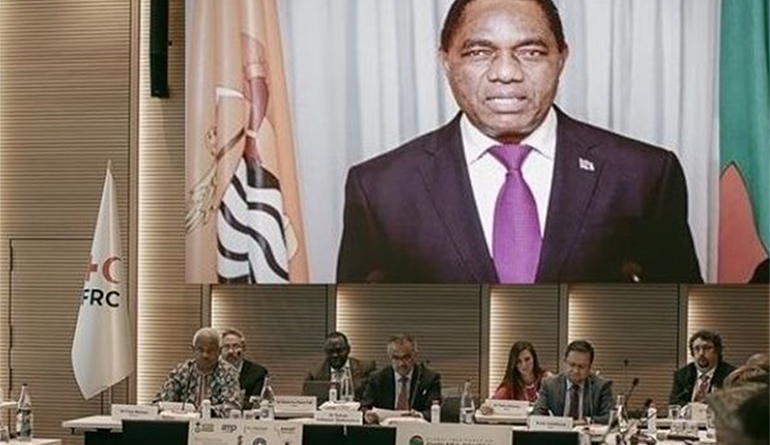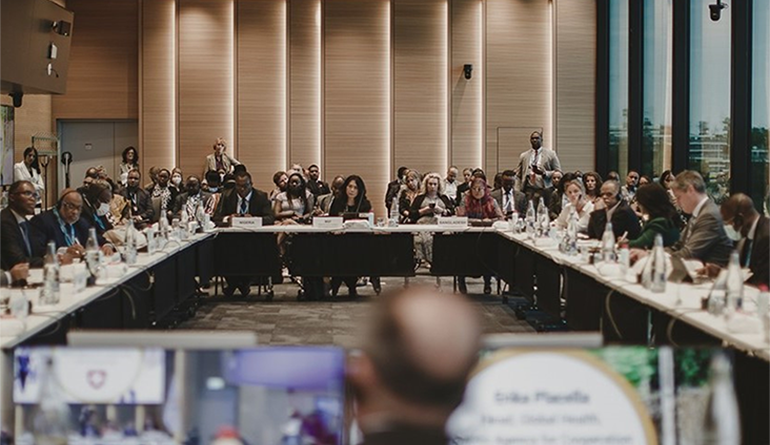News / 13 June 2022
Back to all news
The event was hosted at the International Federation of Red Cross and Red Crescent Societies (IFRC) and highlighted inspiring examples of resilience in fighting cholera. It showcased the perseverance, organization and ingenuity of countries’ efforts to control the disease despite extreme pressures on resources and the challenges of the COVID-19 pandemic. In addition to partners and other high-level speakers, 10 countries participated directly in the event, with six Ministers of Health in attendance – an encouraging sign given the fact that speakers throughout the event stressed the extreme importance of coordination and political will in achieving the Roadmap goals.
In a high-profile example of this strong political commitment, His Excellency Hakainde Hichilema, the President of Zambia, has agreed, at the invitation of WHO, to become a cholera control champion. In video remarks broadcasted during the event, President Hichilema noted the importance of champions in driving national and global cholera agendas. He also recommitted Zambia to the fight against cholera and called other countries and partners to similar action.
Dr Tedros Adhanom Ghebreyesus, Director-General of WHO, also spoke at the event, emphasizing the fact that cholera remains “a disease of inequity.” Noting that the disease has been eliminated from the global north for over 150 years, the DG reminded participants that cholera “almost exclusively affects people in communities without adequate water, sanitation, and hygiene, and those who have been displaced.”

High-level addresses – including remarks from Jagan Chapagain, IFRC’s Secretary General, and Xavier Castellanos Mosquera, IFRC’s Under Secretary General for National Society Development and Operations Coordination – were complemented by three dialogue sessions. The first, entitled Highlighting the flexibility in global approaches to end cholera, featured speakers from the Ministry of Health of the Democratic Republic of the Congo, the Swiss Agency for Development and Cooperation, the Zambia Ministry of Health, the US Centers for Disease Control and Prevention, the Zanzibar Ministry of Health and UNICEF. The second session – Leveraging information and data to inform strategies for cholera control, prevention, and research – saw representatives of the Nepal Ministry of Health and Population, Médecins Sans Frontières, the Bangladesh Ministry of Health and Family Welfare, WaterAid, the Nigeria Centre for Disease Control and Wellcome. In the third session, Ensuring flexible recommitments to global cholera efforts, representatives from WHO, the Ministry of Health and Population of the Republic of Haiti, the Bill & Melinda Gates Foundation, the Ministry of Health of the Republic of Mozambique, the Zimbabwe Ministry of Health and Childcare and Gavi, the Vaccine Alliance had the chance to reaffirm their support for cholera control.
With support from the GTFCC and its partners, several countries have experienced notable cholera successes as of late. In the past year, Bangladesh, Cameroon, Ethiopia, Nepal, Niger and Nigeria all responded successfully to cholera outbreaks. Countries such as the Democratic Republic of the Congo, Malawi, Tanzania, Uganda, Yemen and Zambia conducted preventative campaigns with oral cholera vaccine (OCV) – despite the fact that COVID-19 and pressures, including natural disasters and political unrest, threatened to undo progress. Looking ahead, South Sudan, Bangladesh, Nigeria and Ethiopia are planning to re-launch preventative campaigns. Haiti is celebrating three years of zero cholera, a feat unimaginable just over a decade ago, when it suffered the worst and deadliest cholera outbreak in the modern age. During the event, two more WHO Member States – Ethiopia and Kenya – launched multisectoral National Cholera Plans (NCPs) based on the GTFCC’s six strategic pillars for cholera control: surveillance and reporting; strengthening health care systems; water, sanitation and hygiene (WASH); leadership and multisectoral coordination; use of oral cholera vaccine (OCV); and community engagement.
The work of countries and GTFCC partners has led to a decline in cholera cases and deaths in recent years; but preliminary data for 2021 show a massive resurgence. Trends for 2022 are concerning, with at least 14 countries experiencing new outbreaks to date. While these outbreaks were largely controlled thanks to the efforts of national authorities and GTFCC support, each response depletes limited supplies of OCV and other commodities. It also puts unprecedented strain on global resources and the health systems of affected countries. Avoiding these pressures and making progress requires collaborative action across sectors, strategic use of existing tools, and a common approach to a common threat that has equity at its heart.
To that end, Dr Tedros called for urgent collective effort to increase support in three areas:
The GTFCC will continue its work to lead global efforts in cholera prevention and control, including by building on the strengths, skills, and resources of each of its members.
The GTFCC is a partnership of more than 50 institutions, including NGOs, academic institutions and UN agencies. It gathers organizations working across different sectors through a platform to support countries in the implementation of the GTFCC’s Ending Cholera by 2030 Global Roadmap (“the Roadmap”), a shared global strategy to achieve a 90% reduction in cholera deaths and cholera elimination in 20 countries by 2030. The GTFCC Secretariat hosted at WHO operates via its in-country support mechanism, the Country Support Platform (CSP), which is hosted by the IFRC and provides direct country-level support in priority geographies.
For more information, please contact:
GTFCC Secretariat focal point: Marion Martinez Valiente, WHO Technical Officer, gtfccsecretariat@who.int
GTFCC Country Support Platform: Jayanthi Palani, IFRC CSP Resource Mobilization & Advocacy Senior Officer, countrysupportplatform@ifrc.org